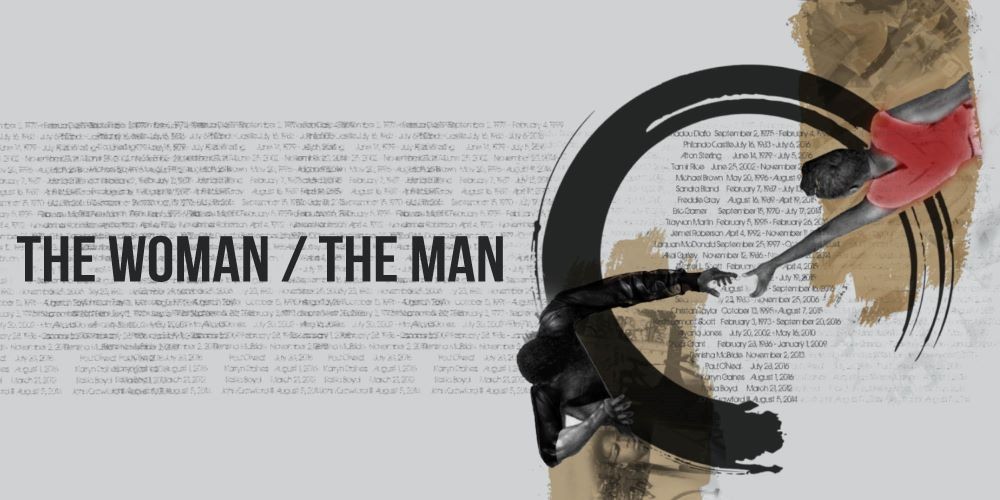Third-Year Director Jeffrey Page Presents Two One-Act Plays by Prominent Black Playwrights
Jeffrey Page’s third-year directing thesis The Woman / The Man: An Evening of Two One-Act Plays premieres next week. The evening is a theatrical double feature comprised of two Obie Award-winning plays: Adrienne Kennedy’s Funnyhouse of a Negro and Suzan-Lori Parks’ The Death of the Last Black Man in the Whole Entire World AKA the Negro Book of the Dead. Written nearly thirty years apart, these two pieces remain as haunting and relevant as the day each was written.
In Funnyhouse of a Negro, Sarah, a young woman living in New York, struggles with her racial identity. A child born at the intersection of Black and White, Sarah encounters images of her heritage through manifestations of historical figures from Jesus Christ to Queen Victoria to Patrice Lumumba in Kennedy’s dreamlike portrait of what it means to be a Woman of Color in America. It was written during the Black Power Movement of the ninety-sixties, the artistic response to this movement was the Black Arts Movement. The play deals with the damaging effects of a people needing to constantly hide an authentic self behind a mask. Wearing the mask of the docile “negro” is necessary in order to gain acceptance into the culture that otherwise looks down upon differences, alternative systems of thought and belief. Sarah, also named “The Negro,” lives in a tight space that suffocates her, both figuratively and literally.
The Death of the Last Black Man in the Whole World AKA The Negro Book of the Dead is about Black Man who is trapped in a perpetual state of execution. The play takes place in “the great hole” in American History where the legacies and lives of the forgotten and omitted African American men and women remain unheard and unseen. Echoes of Black American culture and stereotypes are personified in Parks’ surreal narrative about the historical repetition of racial inequality. It deals with the limited real estate of language as it is meant to provide shape to imagination and thought. The very portal that all beings have in order to allow the transference of thought to be effective is relatively small in comparison to sophisticated imagery, this is in many cultures a life line … a legacy … a story. This story is personified and illustrates the importance of what Henry Louis Gates, Jr. called “signifyin(g)” — a term that Gates coined to define the phenomenon where, black people in particular, have needed to force multilayered ideas into the confines of a prescriptive word. It is a magnificent play about direction through indirection and how this idea is personified within the structures of the white gaze and given new meaning.
We talked with Jeffrey Page about the upcoming production.
Why did you choose two one-act plays rather than focusing on one piece?
I am interested in how these pieces, curated within the same space and time, speak to each other. Suzan-Lori Parks is influenced by Adrienne Kennedy; Death of the Last Black Man seems to riff on the tropes introduced in Funnyhouse. This is fascinating, and looking at these works within the same breath of space teaches me about the world that is being created by the playwrights and also provides me with useful information for how to contextualize our current politics and socio-economic ideologies.
Why these two pieces specifically?
During my time in grad school, I have purposefully spent most of my time with the classical cannon: Shakespeare, the Greeks, Chekhov. I wanted to get a deeper understanding, I feel that if a person can master a thing, well, then a person has the skills to change the thing. I have come to a much more profound understanding of classical text, how it works, how it should be directed, the lessons that it offers us all in life, I am now interested in approaching black text with this information. I think that black text works differently. Zora Neale Hurston is quoted as saying “the white man thinks in written language, while the Negro thinks in hieroglyphics.” The approach is different and if a new kind of investigation and study is not acknowledged it simply doesn’t work. I was interested in this as my thesis study because it's a study that is needed, especially in this day and time.
What are the commonalities between them?
Both plays deal with how space — mentally, emotionally and physically — paralyzes, confines and therefore cripples and opens up the realm of possibilities through the very concept of finding new resources within a state of limitation and oppression.
What challenges have you faced in creating a production where the text comes from two different plays by two different playwrights?
The challenge is that both these plays operate inside of two very different worlds. They require research and careful handling that is very specific to each work. They are written in different spaces of time, Funnyhouse in the ninety-sixties and Death of the Last Black Man in the ninety-nineties and they are both abstract, so to speak, but the level of abstractionism is influenced by two very different palates of taste.
What is your philosophy for directing?
Ego gets in the way, lay it down and fully submit to the work. Your “voice” will come through without forcing it.
What do you find most enjoyable about directing these two pieces?
These plays and these women are so very different. I take joy in learning about their complex layering of sophistication, who would otherwise be lumped simply into some “black” category.
How is it working on plays where the playwrights are currently living?
Scary; the idea that I must collaborate with the plays without the ability to ask questions of the authors is extremely audacious. I can hope that the playwrights, if they were to suddenly appear at the performance, know that I have put an exhaustive amount of care into curating their work and building a world where artists treat words like living things and actually collaborate with those words.
How have you prepared?
Reading lots of essays and books. Last year, I took a full semester to do an independent study with Stephen McKinley Henderson on August Wilson. I also spearheaded a study with two actors on Topdog/Underdog by Suzan-Lori Parks to get acclimated within the world of Parks, this allowed me to dive into the art-making in both practice and theory.
As the director, what has been your greatest challenge?
Giving myself permission to break the rules of the text. I have to constantly remind myself that I am in an active collaboration with the text, which means we—both me and the text—must push and pull. Most of the time, I surrender fully to the text, but because it is rather abstract, surrendering doesn’t always reveal answers of how it wants to be realized.
How do you feel your training at Columbia has prepared you to direct these productions?
In some instances, I feel very strong and very prepared, but in most I feel not so prepared. I believe that there is a lack of understanding and robust study within the academy for the nuance of black text. I have had to pull up the slack myself for what my in-class training could not offer to me. However, one of the most important things that the academics did, in fact, offer me is the ability to know how to ask questions and research on my own. I think that this is the most valuable lesson that I have received from my in-class training.
What's one thing you would tell your first year self?
Shakespeare doesn’t have all the answers, but he has certainly allowed the greater potential for growth and understanding to be revealed—you just have do the work—ain’t no short cuts, homie.

Jeffrey Page is an opera and theatre director of both classical and contemporary works. As director and choreographer, he spearheaded the 2015 and 2018 Tokyo productions of the musical Memphis, which received four Yomiuri Award nominations, including Best Musical. The first African American to be named the Marcus Institute Fellow for Opera Directing at The Juilliard School, he has also been nominated for an Emmy Award. Mr. Page has won an MTV Video Music Award for his work with Beyoncé, whose creative team has included him for more than 12 years. His work was featured on Beyoncé’s "The Formation World Tour," in her historic Coachella Valley Music and Arts Festival performance, and in two of her HBO specials. Mr. Page was the associate creative director for Mariah Carey’s "Sweet, Sweet Fantasy" European Tour, and has been a featured choreographer on Fox Television’s "So You Think You Can Dance." Mr. Page was in the original, award-winning Broadway cast of Fela! (Eugene O’Neill Theatre). He worked alongside Tony Award-winning composer Jeanine Tesori to choreograph the hit Broadway musical Violet starring Sutton Foster (Roundabout Theatre Company). At the Barrington Theatre Company, Mr. Page received glowing reviews as the choreographer for Company, and received a 2016 Berkshire Theater Award for his work on Broadway Bounty Hunter. In 2016, he established Movin’ Legacy as an Indianapolis-based nonprofit organization dedicated to the ethnology and documentation of contemporary and traditional dance from Africa and the African diaspora. Currently, he is completing his MFA in Theatre Directing at Columbia University in New York City.
The Woman / The Man: An Evening of Two One-Act Plays will run from February 13 - 16 in the Flexible Performance Space at Lenfest Center for the Arts. The Directing Thesis production also features performances by: Odera Adimorah, Paris Cymone, Freddie Fulton*, David Glover, Natasha Hakata, Eric Harper*, Lauren Marissa Smith*, Vaughn Pole*, Anthony O. Pratt Jr., Steven Smith, Rachel Sorteberg*, Kirrin Tubo, and Titus VanHook. Get your tickets below.
